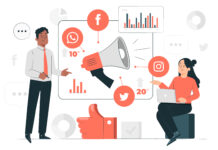Imagine opening your inbox to a sales pitch that mentions your recent product launch, speaks directly to your pain points, and feels like it was written just for you. That’s the power of Generative AI in B2B sales, bringing relevance and resonance to every interaction, at scale.
Today’s buyers are more informed, selective, and digitally empowered than ever. They no longer tolerate cookie-cutter outreach or vague sales pitches. Instead, they expect timely, hyper-personalized communication that adds value from the very first touchpoint.
Generative AI is helping B2B sales teams rise to this challenge by enabling smarter outreach, faster lead qualification, and real-time engagement, without compromising on quality or human touch. From crafting persuasive sales emails to offering tailored coaching, this technology is redefining what effective selling looks like in the modern digital age.
In this blog, we’ll explore how Generative AI is transforming B2B sales processes, the most impactful use cases, real-world ROI, and what the future holds for AI-powered selling.
What is Generative AI in B2B Sales?
Generative AI refers to a class of AI models—like OpenAI’s GPT-4, Google’s Gemini, or Meta’s LLaMA—that can create new content: text, images, code, and more. In B2B sales, these models power tools that can:
- Craft customized outreach emails based on buyer personas
- Summarize buyer intent from CRM and behavioral data
- Provide conversational AI for real-time lead interaction
- Deliver tailored sales scripts and objection handling
This is not just automation—it’s intelligent creation at scale.
Top Use Cases of Generative AI in Sales
1. Hyper-Personalized Outreach
Generative AI enables sales reps to generate tailored messages for each lead at scale. Instead of sending cookie-cutter emails, sales teams can now create content that resonates with the recipient’s industry, job title, recent behavior, or even company news.
Example:
A rep using a tool like Lavender or Copy.ai can input LinkedIn data and generate a high-converting, human-like cold email in seconds.
2. Conversational AI for Lead Qualification
Conversational AI bots, powered by generative models, can engage website visitors, qualify them using intelligent prompts, and hand over warm leads to human sales reps. These bots are more adaptive and natural than scripted chat flows.
Example:
Tools like Drift and Intercom’s Fin AI can converse with prospects, answer complex queries, and book meetings automatically.
3. AI-Powered Sales Coaching
Generative AI can analyze sales calls, emails, and CRM data to provide reps with personalized coaching. It offers feedback on tone, structure, objection handling, and even sentiment.
Example:
Platforms like Gong and Chorus use AI to score calls, suggest improvements, and highlight customer pain points, training sales reps on the fly.
4. Sales Content Generation
Struggling to draft case studies, product summaries, or LinkedIn posts? AI tools can assist in creating pitch decks, email templates, follow-up messages, and social content, all aligned with brand voice and customer needs.
Integration with Existing Sales Tools
Generative AI is not replacing your CRM or email marketing tools; it’s enhancing them. Major platforms have already embedded AI capabilities:
- Salesforce Einstein GPT: AI-generated email drafts, CRM updates, and insights
- HubSpot AI: Smart content creation and workflow suggestions
- Outreach + AI: Predictive lead scoring and message personalization
- ZoomInfo Copilot: Real-time data insights and conversation starters
By integrating with your existing tech stack, these AI enhancements reduce manual effort and accelerate pipeline velocity.
Measurable Business Impact (Bullet Points Version)
Generative AI is delivering real, measurable returns for B2B sales teams:
- Email response rates have increased from a traditional 3–5% to an impressive 12–18% when using AI-generated personalized outreach.
- Lead qualification time has dropped dramatically, from 1–2 days with manual processes to instant responses through AI-powered chatbots.
- Sales rep productivity has seen a significant boost, with teams reporting a 40–50% gain thanks to automation and real-time support.
- Content creation time has been reduced from hours or even days to just minutes, allowing reps to focus more on relationship-building.
Case studies reveal that AI-driven outreach can lead to up to 3x higher open rates and a 50% reduction in sales cycle duration.
Key Challenges and How to Overcome Them
While promising, deploying generative AI in B2B sales comes with risks:
- Accuracy & Hallucination: AI can generate inaccurate info. Always pair AI with human review, especially for compliance-heavy industries.
- Brand Voice Consistency: Use AI with style guides and training data to match your tone.
- Data Privacy: Ensure AI tools comply with GDPR, CCPA, and other data regulations. Opt for tools with secure API access and encryption.
- Sales Rep Adoption: Reps may resist change. Provide training, success stories, and show how AI can help, not replace them.
Future Outlook: What’s Next?
The future of B2B sales will be co-piloted by AI. Emerging trends to watch:
- Real-Time Voice AI Assistants: Joining live calls to suggest responses
- Predictive Deal Closing AI: Scoring deals and timing based on buyer behavior
- Auto-Generated Proposals: From meeting notes to PDF-ready decks
- Multilingual AI Reps: Localized outreach at scale
As generative AI evolves, it will not just support sales; it will co-create value with the sales team, increasing both efficiency and empathy in buyer interactions.
Conclusion
Generative AI is not a futuristic buzzword—it’s a practical tool that’s already reshaping the B2B sales playbook. From cold emails to deal-closing conversations, AI is empowering reps to do more with less and focus on what matters most: building relationships and closing deals.
Forward-thinking sales leaders should explore how to integrate these tools now because your competitors likely already are.






